Unit 2 How often do you exercise?Section B 知识点学案
文档属性
| 名称 | Unit 2 How often do you exercise?Section B 知识点学案 |
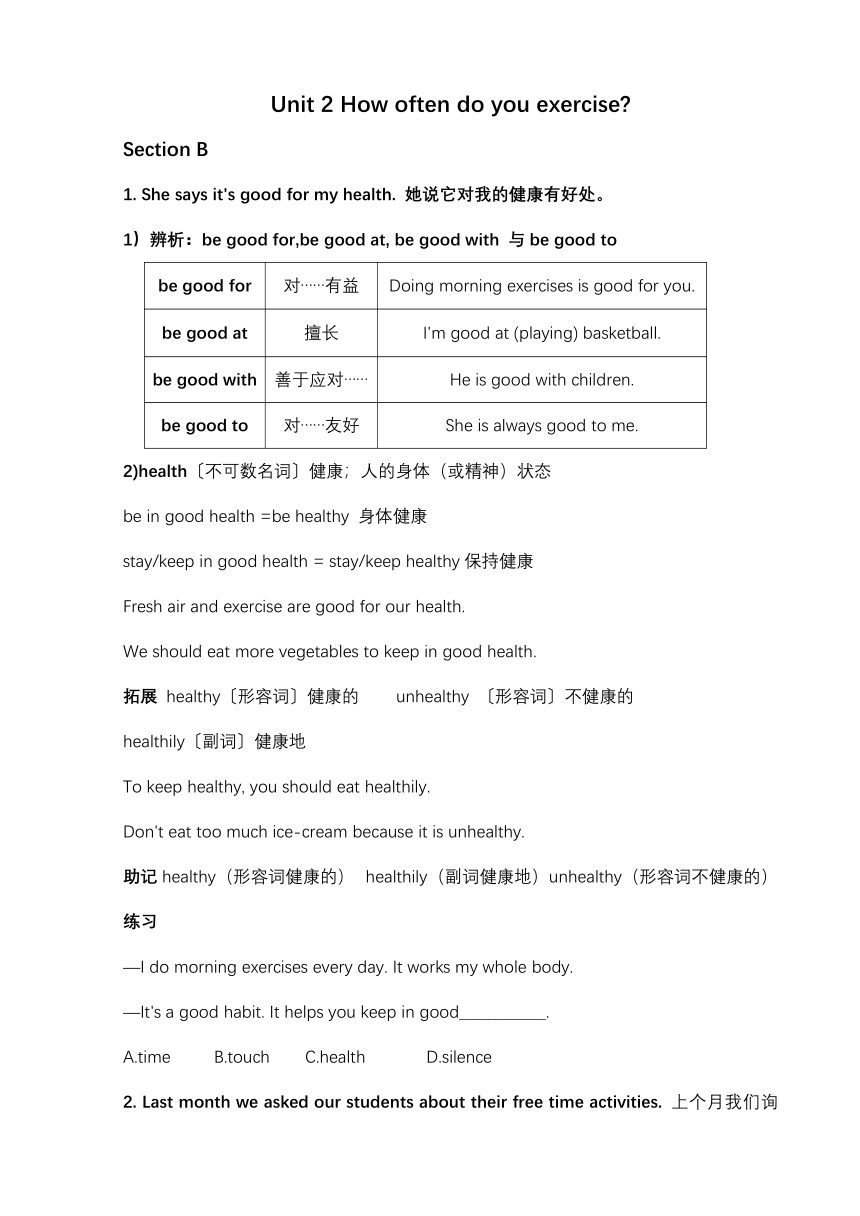
|
|
| 格式 | docx | ||
| 文件大小 | 110.4KB | ||
| 资源类型 | 教案 | ||
| 版本资源 | 人教新目标(Go for it)版 | ||
| 科目 | 英语 | ||
| 更新时间 | 2023-07-09 21:58:01 | ||
图片预览

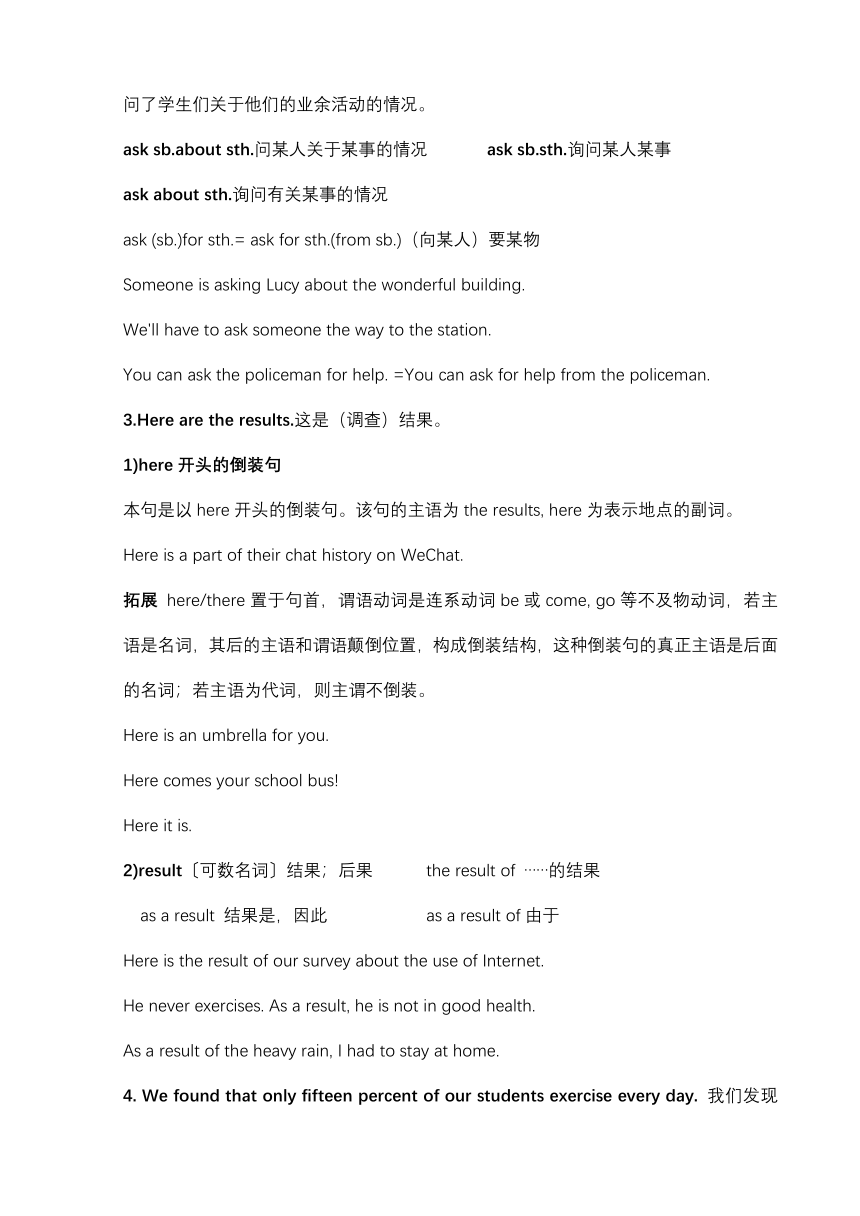
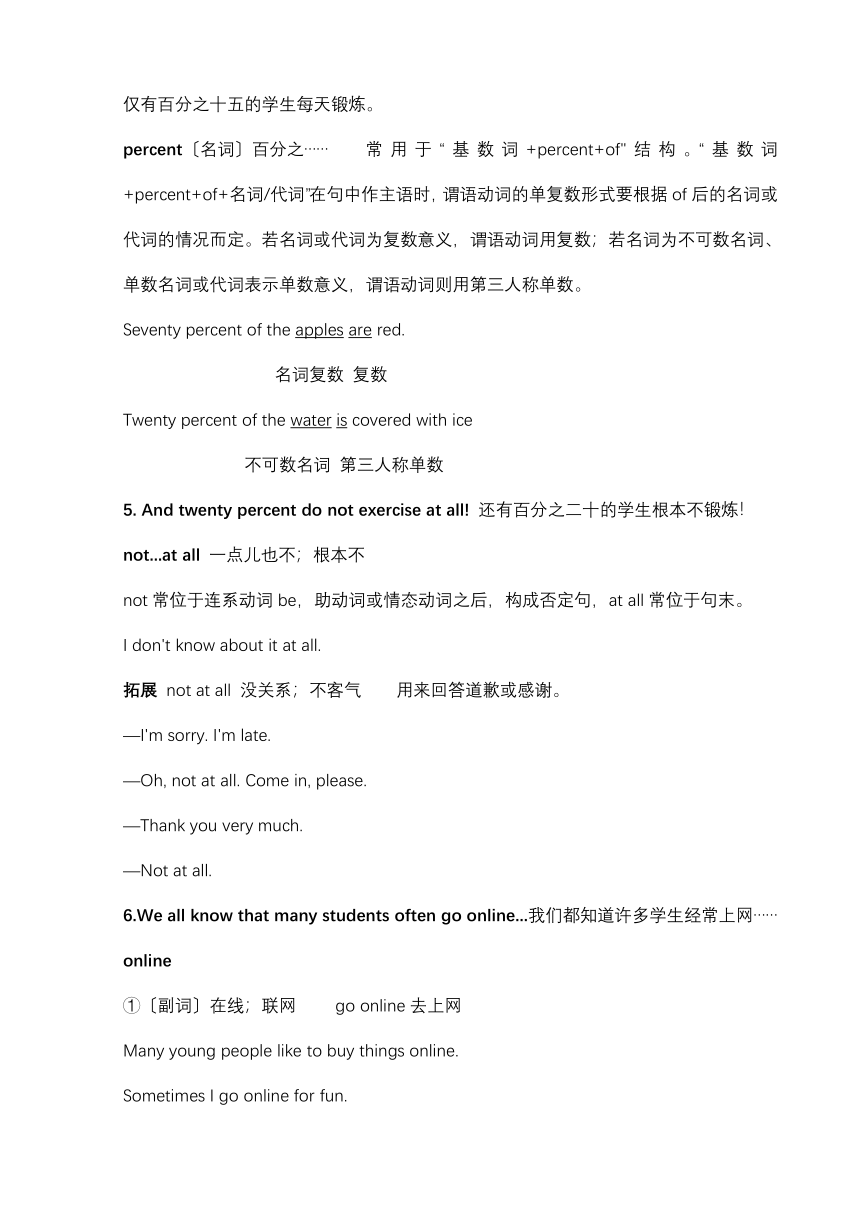
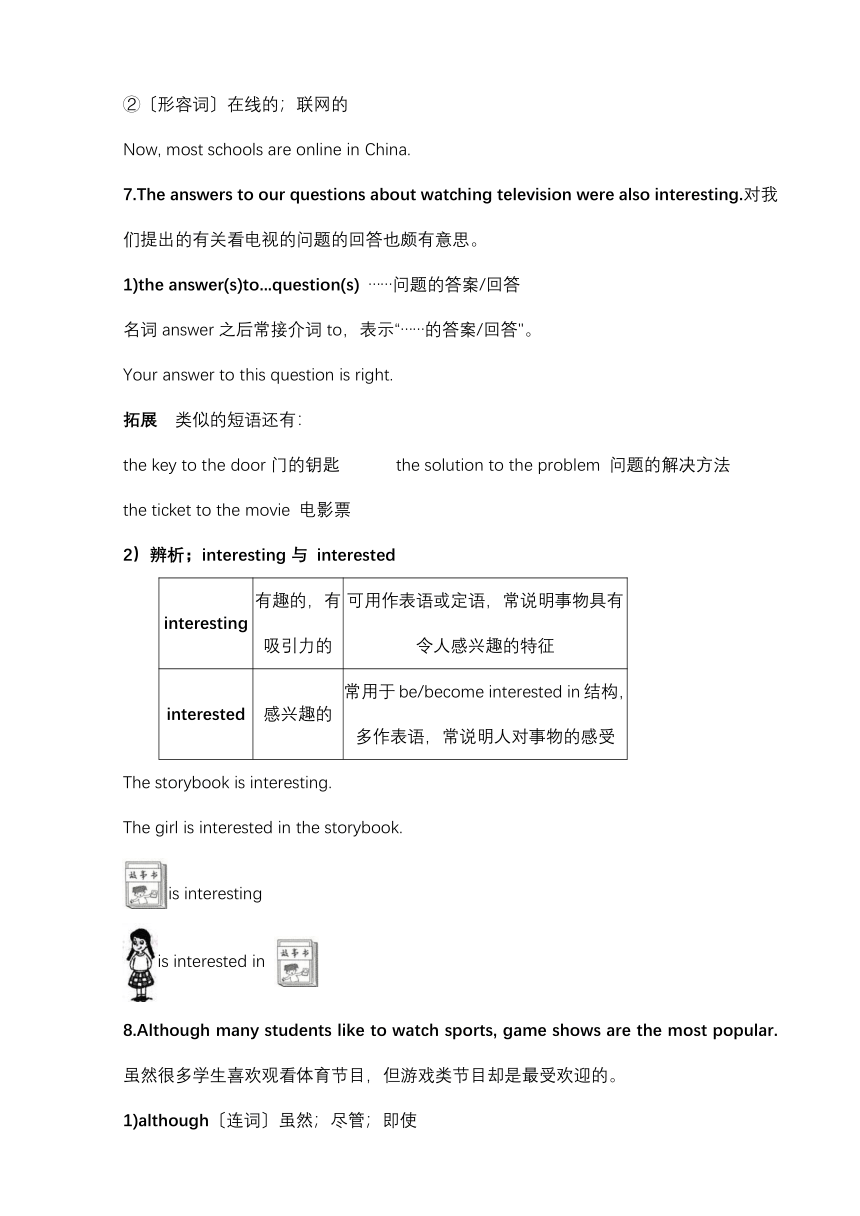
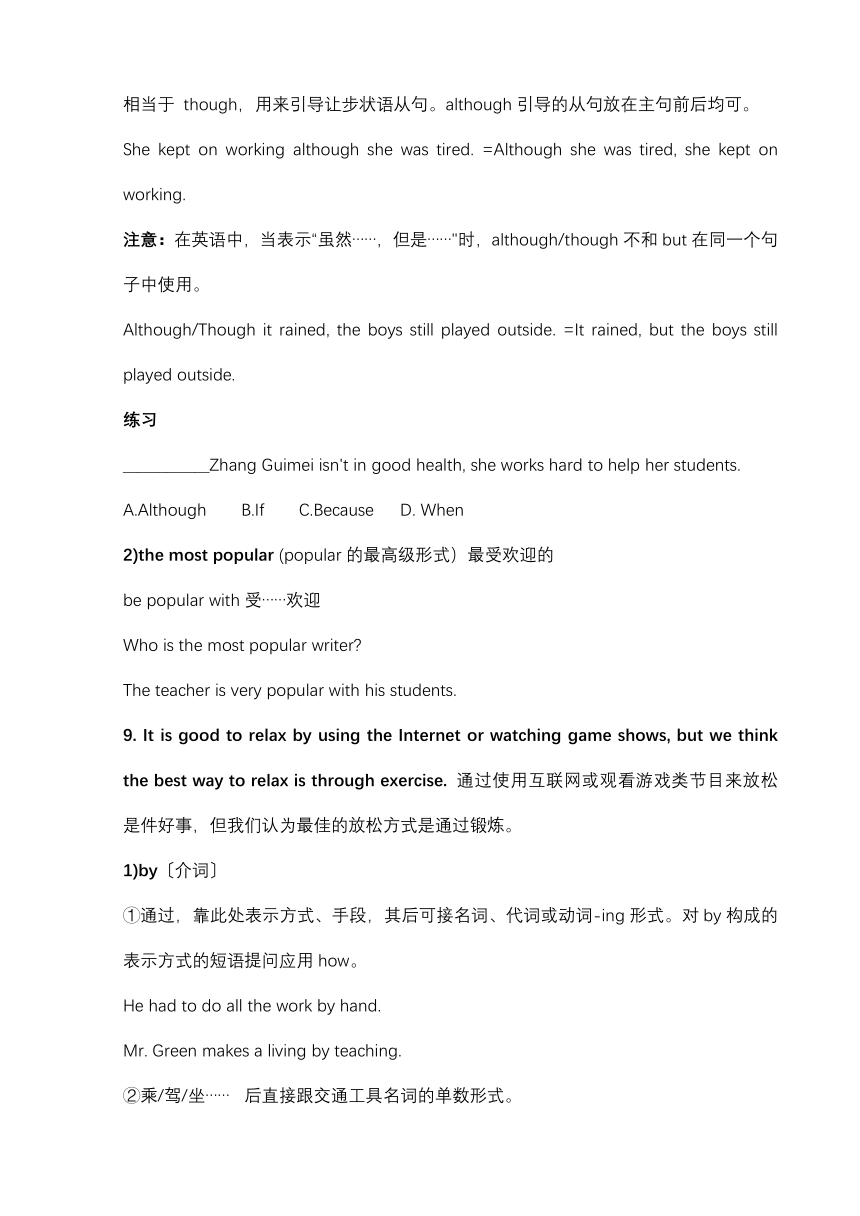
文档简介
Unit 2 How often do you exercise
Section B
1. She says it's good for my health. 她说它对我的健康有好处。
1)辨析:be good for,be good at, be good with 与be good to
be good for 对……有益 Doing morning exercises is good for you.
be good at 擅长 I'm good at (playing) basketball.
be good with 善于应对…… He is good with children.
be good to 对……友好 She is always good to me.
2)health〔不可数名词〕健康;人的身体(或精神)状态
be in good health =be healthy 身体健康
stay/keep in good health = stay/keep healthy保持健康
Fresh air and exercise are good for our health.
We should eat more vegetables to keep in good health.
拓展 healthy〔形容词〕健康的 unhealthy 〔形容词〕不健康的
healthily〔副词〕健康地
To keep healthy, you should eat healthily.
Don't eat too much ice-cream because it is unhealthy.
助记healthy(形容词健康的) healthily(副词健康地)unhealthy(形容词不健康的)
练习
—I do morning exercises every day. It works my whole body.
—It's a good habit. It helps you keep in good____________.
A.time B.touch C.health D.silence
2. Last month we asked our students about their free time activities. 上个月我们询问了学生们关于他们的业余活动的情况。
ask sb.about sth.问某人关于某事的情况 ask sb.sth.询问某人某事
ask about sth.询问有关某事的情况
ask (sb.)for sth.= ask for sth.(from sb.)(向某人)要某物
Someone is asking Lucy about the wonderful building.
We'll have to ask someone the way to the station.
You can ask the policeman for help. =You can ask for help from the policeman.
3.Here are the results.这是(调查)结果。
1)here开头的倒装句
本句是以here开头的倒装句。该句的主语为the results, here为表示地点的副词。
Here is a part of their chat history on WeChat.
拓展 here/there置于句首,谓语动词是连系动词be或come, go等不及物动词,若主语是名词,其后的主语和谓语颠倒位置,构成倒装结构,这种倒装句的真正主语是后面的名词;若主语为代词,则主谓不倒装。
Here is an umbrella for you.
Here comes your school bus!
Here it is.
2)result〔可数名词〕结果;后果 the result of ……的结果
as a result 结果是,因此 as a result of由于
Here is the result of our survey about the use of Internet.
He never exercises. As a result, he is not in good health.
As a result of the heavy rain, I had to stay at home.
4. We found that only fifteen percent of our students exercise every day. 我们发现仅有百分之十五的学生每天锻炼。
percent〔名词〕百分之…… 常用于“基数词+percent+of"结构。“基数词+percent+of+名词/代词”在句中作主语时,谓语动词的单复数形式要根据of后的名词或代词的情况而定。若名词或代词为复数意义,谓语动词用复数;若名词为不可数名词、单数名词或代词表示单数意义,谓语动词则用第三人称单数。
Seventy percent of the apples are red.
名词复数 复数
Twenty percent of the water is covered with ice
不可数名词 第三人称单数
5. And twenty percent do not exercise at all! 还有百分之二十的学生根本不锻炼!
not...at all 一点儿也不;根本不
not常位于连系动词be,助动词或情态动词之后,构成否定句,at all常位于句末。
I don't know about it at all.
拓展 not at all 没关系;不客气 用来回答道歉或感谢。
—I'm sorry. I'm late.
—Oh, not at e in, please.
—Thank you very much.
—Not at all.
6.We all know that many students often go online...我们都知道许多学生经常上网……
online
①〔副词〕在线;联网 go online去上网
Many young people like to buy things online.
Sometimes I go online for fun.
②〔形容词〕在线的;联网的
Now, most schools are online in China.
7.The answers to our questions about watching television were also interesting.对我们提出的有关看电视的问题的回答也颇有意思。
1)the answer(s)to...question(s) ……问题的答案/回答
名词answer之后常接介词to,表示“……的答案/回答"。
Your answer to this question is right.
拓展 类似的短语还有:
the key to the door门的钥匙 the solution to the problem 问题的解决方法
the ticket to the movie 电影票
2)辨析;interesting与 interested
interesting 有趣的,有吸引力的 可用作表语或定语,常说明事物具有令人感兴趣的特征
interested 感兴趣的 常用于be/become interested in结构,多作表语,常说明人对事物的感受
The storybook is interesting.
The girl is interested in the storybook.
is interesting
is interested in
8.Although many students like to watch sports, game shows are the most popular.虽然很多学生喜欢观看体育节目,但游戏类节目却是最受欢迎的。
1)although〔连词〕虽然;尽管;即使
相当于 though,用来引导让步状语从句。although引导的从句放在主句前后均可。
She kept on working although she was tired. =Although she was tired, she kept on working.
注意:在英语中,当表示“虽然……,但是……"时,although/though不和but在同一个句子中使用。
Although/Though it rained, the boys still played outside. =It rained, but the boys still played outside.
练习
____________Zhang Guimei isn't in good health, she works hard to help her students.
A.Although B.If C.Because D. When
2)the most popular (popular的最高级形式)最受欢迎的
be popular with受……欢迎
Who is the most popular writer
The teacher is very popular with his students.
9. It is good to relax by using the Internet or watching game shows, but we think the best way to relax is through exercise. 通过使用互联网或观看游戏类节目来放松是件好事,但我们认为最佳的放松方式是通过锻炼。
1)by〔介词〕
①通过,靠此处表示方式、手段,其后可接名词、代词或动词-ing形式。对by构成的表示方式的短语提问应用how。
He had to do all the work by hand.
Mr. Green makes a living by teaching.
②乘/驾/坐…… 后直接跟交通工具名词的单数形式。
I went to Beijing by plane.
③到……时(为止);在……以前 后跟时间。
I must be in bed by ten o'clock.
④在……旁边后跟地点。
We live by the sea.
练习
—How do you relax in your free time
—____________doing sports and listening to music.
A.At B.On C.In D.By
2)the best way to do sth.做某事的最佳方式
不定式作后置定语,修饰前面的the best way。
The best way to leam English is to speak it everyday.
拓展 one/a way to do sth.= one/a way of doing sth.做某事的方式
Going to a party is one way to meet new friends. = Going to a party is one way of meeting new friends.
3)through〔介词〕
①以;凭借 He got good grades through hard work.
②穿过;贯穿 The path led through the trees to the river.
练习
You can only achieve success(取得成功)____________hard work.
A. across B. above C.through D. into
4)辨析:through, over与 across
through over across
(从内部) (从上方) (从表面)
穿过;横过 越过 横过;穿过
She walked through the forest alone.
A plane flew over the house.
He walked across the road carefully.
10.It is healthy for the mind and the body.它对身心健康有益。
mind〔名词〕头脑;心智
change one's mind 改变某人的主意 make up one's mind 下决心;决定
in one's mind在某人看来;在某人心里 keep one's mind on sth.专心于某事
keep...in mind 牢记
He has a very sharp mind.
Mind and body are closely related.
In his mind, helping others is just helping himself.
11.Exercise such as playing sports is fun, and you can spend time with your friends and family as you play together.像参加体育活动这样的锻炼方式不但有趣,而且当你和你的朋友、家人一起运动时,你们还可以共度时光。
1)such as 例如;像……这样 多用来列举同类人或事物中的几个。
He has many hobbies, such as swimming and reading.
2) such
①〔形容词〕这样的;那样的;类似的
表示像上文或下文提到的人或事物那样。主要有“such+不可数名词”“such+可数名词复数”和“such+a/an+可数名词单数"三种结构。
She hopes to find somebody kind, and she thinks Tom is such a person.
注意:such与不定冠词a/an连用时放在a/an前,但与all,no,one,few, some,any,several等连用时应放在这些词后。
He said he didn't have time or made some such excuses.
②〔形容词〕这样,非常,如此 强调程度。
“such+a/an+ 形容词+可数名词单数”如此……的一个……
“such+形容词+可数名词复数/不可数名词”如此……的……
It's such a long way from here.
They're such nice people.
③〔代词〕这样的人(或事物),类似的人(或事物)
Such was the result.
3) spend〔及物动词〕度过;花费(时间、金钱等)
Come and spend the weekend with us.
4)辨析:spend, cost, take与pay
spend 花费(时间、金钱等) 主语是人 常用结构为spend...on sth.和spend...doing sth.
cost 价格为;花费 主语多为物 常用句型为“Sth. cost(s)sb.some money."
take 花费(时间) it作形式主语,真正的主语是后面的动词不定式 常用句型为“It takes sb. some time to do sth."
pay 支付(钱) 主语是人 常用结构为pay...for sth.
I spent 200 yuan on a new coat.
Don't spend too much time watching TV.
The dictionary cost me 89 yuan.
It takes me at least thirty minutes to exercise every day.
I paid 15 yuan for the pen.
练习
Jim, you'd better not____________too much time on your mobile phone.
A.cost B.spend C.take D.pay
5) together〔副词〕在一起;共同
together with 和……一起 get together 聚在一起
We decided to learn swing dance together.
Tom together with his brother helps with housework on weekends.
注意:当together with sb./sth.在主语后时,它不会改变主语的单复数形式,谓语动词必须与主语的单复数保持一致。
12. And remember,"Old habits die hard."而且请记住:“旧习难改。”
die〔不及物动词〕消失;灭亡;死亡
过去式为died,现在分 词 为dying。
注意:die是非延续性动词,不能与时间段连用。
Some old art forms are dying.
The old man died two months ago.
助记:die动词 死;死亡 dead形容词 死的;死亡的 death名词 死;死亡
13.Jane is a 16-year-old high school student in the United States.简是一名十六岁的美国中学生。
复合形容词
16-year-old意为“16岁的”,是由“基数词+连字符+名词+连字符+形容词”构成的复合形容词,其中的名词要用单数形式。复合形容词在句中作定语。
Li Bo is a 10-year-old boy. = Li Bo is a boy of 10 years old.
注意:用这种表达方式时,若数词为8,11, 18,80等,前面的不定冠词需用 an。
14.However, she has some bad habits, too.然而,她也有一些坏习惯。
1)辨析:however与 but
however 副词 然而,不过 用于句中,用逗号隔开,也 可用于句首 表示一种补充 关系
but 连词 但是 用于连接两个意思相反或不同的内容,书面语中通常不用于句首,后常无逗号 表示转折关系
It began to rain. However, we went out to look for the boy.
You may be right but I don't believe you.
2)辨析:too, also与either
too 常用于肯定句或一般疑问句 位于句末,其前常加逗号
also 常用于肯定句 位于句中,助动词、连系动词be或情态动词之后,实义动词之前
either 常用于否定句 位于句末,其前常加逗号
Lucy likes red. I like red, too.
They also agree with me.
If he doesn't go, I won't either.
助记:too, also与either
too句末,also句中,都可用在肯定中。如果要来表否定,我们要把either用。
15.She usually watches TV for more than two hours a day...她通常一天看两个多小时的电视……
1)for〔介词〕达,计 表示动作或情况持续的时间。
He uses the Internet for an hour every week.
2)more than 超过;多于 与over同义,其后常与数词连用。
more than/over ten years 十多年
16...she never goes to the dentist for teeth cleaning.……她从不去找牙医清洁牙齿。
1) go to the dentist 去看牙医 相当于see a dentist。
—How often do you go to the dentist
—Once a month.
2)teeth cleaning 牙齿清洁
是名词短语,属于“名词+v.-ing”结构。类似的短语还有English reading“英语阅读”,
horse riding“骑马”等。
Teeth cleaning can help you stay healthy.
17.She says she is afraid!她说她害怕!
afraid〔形容词〕担心的;害怕的
afraid在句中一般作表语,不用在名词前面作定语。主要用法如下:
①be afraid to do sth.不敢去做某事
I'm afraid to travel by plane.
②be afraid of sb./sth.害怕某人/某事(物) be afraid of doing sth.害怕做某事
Why are we afraid of change
Don't be afraid of asking questions.
③I'm afraid (+that)+从句. 恐怕……,很抱歉……
I'm afraid (that) I have to go now.
18. Almost every day. 几乎每天。
almost〔程度副词〕几乎;差不多
与nearly 同义,常位于实义动词之前,连系动词be、情态动词或助动词之后。
I almost forget to write to him.
It was almost like a good dream.
注意
almost之前不可用very, not等词,但在no,none,never,nothing等否定词之前可用 almost。
There is not almost anything in the room. (x)
There is almost nothing in the room. (√)
19. None. 没有一个。
none(没有一个;毫无) no one(没有人)
既可指人,也可指物 只能指人,不能指物
可单独使用,也可和of连用,后跟不可数名词或可数名词复数 一般单独使用,不和of连用
none of与不可数名词连用作主语时,谓语动词用单数;与可数名词复数连用作主语时,谓语动词用 单、复数均可 作主语时,谓语动词用单数
可用于回答以how many或how much开头的问句 可用于回答以who 开头的问句
None of us went to the park.
—How many birds can you see
—None.
No one wants to leave.
—Who likes that place
—No one.
20.Less than six.不到六个(小时)。
1)less than 不到;少于 反义短语为more than,意为“多于;超过”。
He sleeps less than seven hours every night.
2)less (little 的比较级)
①〔副词〕较少;较小
Talk less and do more.
②〔形容词或代词〕较少的;更少的 用作形容词时修饰不可数名词。
Drinking less coffee is good for your health.
We have less to worry about now.
练习
Students have____________(little) homework than before because of the "double reduction"policy (“双减”政策).
21.9- 12 points: You're really healthy! 9~12分:你非常健康!
point
①〔可数名词〕得分;点
We won the match by 15 points to 5.
The first player to get 25 points is the winner.
②〔动词〕指;指向
point at指着 point to 指向 point out指出
It's rude to point at others.
知识梳理
用法集萃
1. help sb.with sth.=help sb.(to)do sth.帮助某人做某事
2.want(sb.)to do sth.想要(某人)做某事 3. have to do sth.不得不做某事
4.by doing sth.通过做某事 5.start doing/to do sth.开始做某事
6. the best way to do sth.= the best way of doing sth.做某事的最好方式
7. How often do/does sb.do... 某人多久做一次……
8. What kind of 什么种类的……
9.What do/does sb.usually do on weekends?某人在周末通常做什么?
10.How about(doing)… (做)……怎么样?
11.It's+形容词+to do sth.做某事是……的。
12. What’s your favorite... 你最喜爱的是什么?
13.Here is/are+名词 这是……
语法专项
频度副词
1.频度副词的含义
(1)表示事情发生频率的副词称为频度副词。常用的频度副词有always(总是),usually(通常),often (经常),sometimes(有时),seldom(很少),hardly ever(几乎从不),never(从不)等。这些频度副词在频率上的差异如图所示:
always usually often sometimes seldom hardly ever never
John always comes late.
He hardly ever exercises.
(2)表示具体的频率时常用到次数,一次用once,两次用twice,三次及三次以上用“基数词+times”。
I play football twice a week.
She watches TV four times a week.
2.频度副词在句中的位置
频度副词一般用在实义动词之前,连系动词be、助动词或情态动词之后,有时为了强调,也可置于句首。
We never eat junk food.
Lucy is sometimes very busy.
I can hardly say a word.
Sometimes Jack plays computer games.
Very often he goes online.
Usually my father gets up early.
注意:always一般不用于句首,但可用于祈使句句首。 Always remember this.
3.对频度副词提问时,用how often。
—How often do you exercise
—Hardly ever.
(1)Tina gets up early every morning, so she is____________late for school.
A.often B.always C.usually D.never
(2)I____________go to the art museum because I like painting.
A.often B.hardly C.never
语法专练
1. He is the first to get to school every day. He is____________late for school.
A.always B.often C.sometimes D.never
2.—Ms. Lin is very popular with the students.
—Yes. Her classes are____________lively and interesting.
A.always B.sometimes C.hardly D.never
3. Father____________goes to the gym with me although he dislikes going there.
A.never B.hardly C.seldom D.sometimes
4. Tina____________drives to work. But today she drives because of the rain.
A. Always B.often C.sometimes D. hardly ever
5.—____________ you exercise
—Every day.
A. How long B.Why C.What time D.How often
Section B
1. She says it's good for my health. 她说它对我的健康有好处。
1)辨析:be good for,be good at, be good with 与be good to
be good for 对……有益 Doing morning exercises is good for you.
be good at 擅长 I'm good at (playing) basketball.
be good with 善于应对…… He is good with children.
be good to 对……友好 She is always good to me.
2)health〔不可数名词〕健康;人的身体(或精神)状态
be in good health =be healthy 身体健康
stay/keep in good health = stay/keep healthy保持健康
Fresh air and exercise are good for our health.
We should eat more vegetables to keep in good health.
拓展 healthy〔形容词〕健康的 unhealthy 〔形容词〕不健康的
healthily〔副词〕健康地
To keep healthy, you should eat healthily.
Don't eat too much ice-cream because it is unhealthy.
助记healthy(形容词健康的) healthily(副词健康地)unhealthy(形容词不健康的)
练习
—I do morning exercises every day. It works my whole body.
—It's a good habit. It helps you keep in good____________.
A.time B.touch C.health D.silence
2. Last month we asked our students about their free time activities. 上个月我们询问了学生们关于他们的业余活动的情况。
ask sb.about sth.问某人关于某事的情况 ask sb.sth.询问某人某事
ask about sth.询问有关某事的情况
ask (sb.)for sth.= ask for sth.(from sb.)(向某人)要某物
Someone is asking Lucy about the wonderful building.
We'll have to ask someone the way to the station.
You can ask the policeman for help. =You can ask for help from the policeman.
3.Here are the results.这是(调查)结果。
1)here开头的倒装句
本句是以here开头的倒装句。该句的主语为the results, here为表示地点的副词。
Here is a part of their chat history on WeChat.
拓展 here/there置于句首,谓语动词是连系动词be或come, go等不及物动词,若主语是名词,其后的主语和谓语颠倒位置,构成倒装结构,这种倒装句的真正主语是后面的名词;若主语为代词,则主谓不倒装。
Here is an umbrella for you.
Here comes your school bus!
Here it is.
2)result〔可数名词〕结果;后果 the result of ……的结果
as a result 结果是,因此 as a result of由于
Here is the result of our survey about the use of Internet.
He never exercises. As a result, he is not in good health.
As a result of the heavy rain, I had to stay at home.
4. We found that only fifteen percent of our students exercise every day. 我们发现仅有百分之十五的学生每天锻炼。
percent〔名词〕百分之…… 常用于“基数词+percent+of"结构。“基数词+percent+of+名词/代词”在句中作主语时,谓语动词的单复数形式要根据of后的名词或代词的情况而定。若名词或代词为复数意义,谓语动词用复数;若名词为不可数名词、单数名词或代词表示单数意义,谓语动词则用第三人称单数。
Seventy percent of the apples are red.
名词复数 复数
Twenty percent of the water is covered with ice
不可数名词 第三人称单数
5. And twenty percent do not exercise at all! 还有百分之二十的学生根本不锻炼!
not...at all 一点儿也不;根本不
not常位于连系动词be,助动词或情态动词之后,构成否定句,at all常位于句末。
I don't know about it at all.
拓展 not at all 没关系;不客气 用来回答道歉或感谢。
—I'm sorry. I'm late.
—Oh, not at e in, please.
—Thank you very much.
—Not at all.
6.We all know that many students often go online...我们都知道许多学生经常上网……
online
①〔副词〕在线;联网 go online去上网
Many young people like to buy things online.
Sometimes I go online for fun.
②〔形容词〕在线的;联网的
Now, most schools are online in China.
7.The answers to our questions about watching television were also interesting.对我们提出的有关看电视的问题的回答也颇有意思。
1)the answer(s)to...question(s) ……问题的答案/回答
名词answer之后常接介词to,表示“……的答案/回答"。
Your answer to this question is right.
拓展 类似的短语还有:
the key to the door门的钥匙 the solution to the problem 问题的解决方法
the ticket to the movie 电影票
2)辨析;interesting与 interested
interesting 有趣的,有吸引力的 可用作表语或定语,常说明事物具有令人感兴趣的特征
interested 感兴趣的 常用于be/become interested in结构,多作表语,常说明人对事物的感受
The storybook is interesting.
The girl is interested in the storybook.
is interesting
is interested in
8.Although many students like to watch sports, game shows are the most popular.虽然很多学生喜欢观看体育节目,但游戏类节目却是最受欢迎的。
1)although〔连词〕虽然;尽管;即使
相当于 though,用来引导让步状语从句。although引导的从句放在主句前后均可。
She kept on working although she was tired. =Although she was tired, she kept on working.
注意:在英语中,当表示“虽然……,但是……"时,although/though不和but在同一个句子中使用。
Although/Though it rained, the boys still played outside. =It rained, but the boys still played outside.
练习
____________Zhang Guimei isn't in good health, she works hard to help her students.
A.Although B.If C.Because D. When
2)the most popular (popular的最高级形式)最受欢迎的
be popular with受……欢迎
Who is the most popular writer
The teacher is very popular with his students.
9. It is good to relax by using the Internet or watching game shows, but we think the best way to relax is through exercise. 通过使用互联网或观看游戏类节目来放松是件好事,但我们认为最佳的放松方式是通过锻炼。
1)by〔介词〕
①通过,靠此处表示方式、手段,其后可接名词、代词或动词-ing形式。对by构成的表示方式的短语提问应用how。
He had to do all the work by hand.
Mr. Green makes a living by teaching.
②乘/驾/坐…… 后直接跟交通工具名词的单数形式。
I went to Beijing by plane.
③到……时(为止);在……以前 后跟时间。
I must be in bed by ten o'clock.
④在……旁边后跟地点。
We live by the sea.
练习
—How do you relax in your free time
—____________doing sports and listening to music.
A.At B.On C.In D.By
2)the best way to do sth.做某事的最佳方式
不定式作后置定语,修饰前面的the best way。
The best way to leam English is to speak it everyday.
拓展 one/a way to do sth.= one/a way of doing sth.做某事的方式
Going to a party is one way to meet new friends. = Going to a party is one way of meeting new friends.
3)through〔介词〕
①以;凭借 He got good grades through hard work.
②穿过;贯穿 The path led through the trees to the river.
练习
You can only achieve success(取得成功)____________hard work.
A. across B. above C.through D. into
4)辨析:through, over与 across
through over across
(从内部) (从上方) (从表面)
穿过;横过 越过 横过;穿过
She walked through the forest alone.
A plane flew over the house.
He walked across the road carefully.
10.It is healthy for the mind and the body.它对身心健康有益。
mind〔名词〕头脑;心智
change one's mind 改变某人的主意 make up one's mind 下决心;决定
in one's mind在某人看来;在某人心里 keep one's mind on sth.专心于某事
keep...in mind 牢记
He has a very sharp mind.
Mind and body are closely related.
In his mind, helping others is just helping himself.
11.Exercise such as playing sports is fun, and you can spend time with your friends and family as you play together.像参加体育活动这样的锻炼方式不但有趣,而且当你和你的朋友、家人一起运动时,你们还可以共度时光。
1)such as 例如;像……这样 多用来列举同类人或事物中的几个。
He has many hobbies, such as swimming and reading.
2) such
①〔形容词〕这样的;那样的;类似的
表示像上文或下文提到的人或事物那样。主要有“such+不可数名词”“such+可数名词复数”和“such+a/an+可数名词单数"三种结构。
She hopes to find somebody kind, and she thinks Tom is such a person.
注意:such与不定冠词a/an连用时放在a/an前,但与all,no,one,few, some,any,several等连用时应放在这些词后。
He said he didn't have time or made some such excuses.
②〔形容词〕这样,非常,如此 强调程度。
“such+a/an+ 形容词+可数名词单数”如此……的一个……
“such+形容词+可数名词复数/不可数名词”如此……的……
It's such a long way from here.
They're such nice people.
③〔代词〕这样的人(或事物),类似的人(或事物)
Such was the result.
3) spend〔及物动词〕度过;花费(时间、金钱等)
Come and spend the weekend with us.
4)辨析:spend, cost, take与pay
spend 花费(时间、金钱等) 主语是人 常用结构为spend...on sth.和spend...doing sth.
cost 价格为;花费 主语多为物 常用句型为“Sth. cost(s)sb.some money."
take 花费(时间) it作形式主语,真正的主语是后面的动词不定式 常用句型为“It takes sb. some time to do sth."
pay 支付(钱) 主语是人 常用结构为pay...for sth.
I spent 200 yuan on a new coat.
Don't spend too much time watching TV.
The dictionary cost me 89 yuan.
It takes me at least thirty minutes to exercise every day.
I paid 15 yuan for the pen.
练习
Jim, you'd better not____________too much time on your mobile phone.
A.cost B.spend C.take D.pay
5) together〔副词〕在一起;共同
together with 和……一起 get together 聚在一起
We decided to learn swing dance together.
Tom together with his brother helps with housework on weekends.
注意:当together with sb./sth.在主语后时,它不会改变主语的单复数形式,谓语动词必须与主语的单复数保持一致。
12. And remember,"Old habits die hard."而且请记住:“旧习难改。”
die〔不及物动词〕消失;灭亡;死亡
过去式为died,现在分 词 为dying。
注意:die是非延续性动词,不能与时间段连用。
Some old art forms are dying.
The old man died two months ago.
助记:die动词 死;死亡 dead形容词 死的;死亡的 death名词 死;死亡
13.Jane is a 16-year-old high school student in the United States.简是一名十六岁的美国中学生。
复合形容词
16-year-old意为“16岁的”,是由“基数词+连字符+名词+连字符+形容词”构成的复合形容词,其中的名词要用单数形式。复合形容词在句中作定语。
Li Bo is a 10-year-old boy. = Li Bo is a boy of 10 years old.
注意:用这种表达方式时,若数词为8,11, 18,80等,前面的不定冠词需用 an。
14.However, she has some bad habits, too.然而,她也有一些坏习惯。
1)辨析:however与 but
however 副词 然而,不过 用于句中,用逗号隔开,也 可用于句首 表示一种补充 关系
but 连词 但是 用于连接两个意思相反或不同的内容,书面语中通常不用于句首,后常无逗号 表示转折关系
It began to rain. However, we went out to look for the boy.
You may be right but I don't believe you.
2)辨析:too, also与either
too 常用于肯定句或一般疑问句 位于句末,其前常加逗号
also 常用于肯定句 位于句中,助动词、连系动词be或情态动词之后,实义动词之前
either 常用于否定句 位于句末,其前常加逗号
Lucy likes red. I like red, too.
They also agree with me.
If he doesn't go, I won't either.
助记:too, also与either
too句末,also句中,都可用在肯定中。如果要来表否定,我们要把either用。
15.She usually watches TV for more than two hours a day...她通常一天看两个多小时的电视……
1)for〔介词〕达,计 表示动作或情况持续的时间。
He uses the Internet for an hour every week.
2)more than 超过;多于 与over同义,其后常与数词连用。
more than/over ten years 十多年
16...she never goes to the dentist for teeth cleaning.……她从不去找牙医清洁牙齿。
1) go to the dentist 去看牙医 相当于see a dentist。
—How often do you go to the dentist
—Once a month.
2)teeth cleaning 牙齿清洁
是名词短语,属于“名词+v.-ing”结构。类似的短语还有English reading“英语阅读”,
horse riding“骑马”等。
Teeth cleaning can help you stay healthy.
17.She says she is afraid!她说她害怕!
afraid〔形容词〕担心的;害怕的
afraid在句中一般作表语,不用在名词前面作定语。主要用法如下:
①be afraid to do sth.不敢去做某事
I'm afraid to travel by plane.
②be afraid of sb./sth.害怕某人/某事(物) be afraid of doing sth.害怕做某事
Why are we afraid of change
Don't be afraid of asking questions.
③I'm afraid (+that)+从句. 恐怕……,很抱歉……
I'm afraid (that) I have to go now.
18. Almost every day. 几乎每天。
almost〔程度副词〕几乎;差不多
与nearly 同义,常位于实义动词之前,连系动词be、情态动词或助动词之后。
I almost forget to write to him.
It was almost like a good dream.
注意
almost之前不可用very, not等词,但在no,none,never,nothing等否定词之前可用 almost。
There is not almost anything in the room. (x)
There is almost nothing in the room. (√)
19. None. 没有一个。
none(没有一个;毫无) no one(没有人)
既可指人,也可指物 只能指人,不能指物
可单独使用,也可和of连用,后跟不可数名词或可数名词复数 一般单独使用,不和of连用
none of与不可数名词连用作主语时,谓语动词用单数;与可数名词复数连用作主语时,谓语动词用 单、复数均可 作主语时,谓语动词用单数
可用于回答以how many或how much开头的问句 可用于回答以who 开头的问句
None of us went to the park.
—How many birds can you see
—None.
No one wants to leave.
—Who likes that place
—No one.
20.Less than six.不到六个(小时)。
1)less than 不到;少于 反义短语为more than,意为“多于;超过”。
He sleeps less than seven hours every night.
2)less (little 的比较级)
①〔副词〕较少;较小
Talk less and do more.
②〔形容词或代词〕较少的;更少的 用作形容词时修饰不可数名词。
Drinking less coffee is good for your health.
We have less to worry about now.
练习
Students have____________(little) homework than before because of the "double reduction"policy (“双减”政策).
21.9- 12 points: You're really healthy! 9~12分:你非常健康!
point
①〔可数名词〕得分;点
We won the match by 15 points to 5.
The first player to get 25 points is the winner.
②〔动词〕指;指向
point at指着 point to 指向 point out指出
It's rude to point at others.
知识梳理
用法集萃
1. help sb.with sth.=help sb.(to)do sth.帮助某人做某事
2.want(sb.)to do sth.想要(某人)做某事 3. have to do sth.不得不做某事
4.by doing sth.通过做某事 5.start doing/to do sth.开始做某事
6. the best way to do sth.= the best way of doing sth.做某事的最好方式
7. How often do/does sb.do... 某人多久做一次……
8. What kind of 什么种类的……
9.What do/does sb.usually do on weekends?某人在周末通常做什么?
10.How about(doing)… (做)……怎么样?
11.It's+形容词+to do sth.做某事是……的。
12. What’s your favorite... 你最喜爱的是什么?
13.Here is/are+名词 这是……
语法专项
频度副词
1.频度副词的含义
(1)表示事情发生频率的副词称为频度副词。常用的频度副词有always(总是),usually(通常),often (经常),sometimes(有时),seldom(很少),hardly ever(几乎从不),never(从不)等。这些频度副词在频率上的差异如图所示:
always usually often sometimes seldom hardly ever never
John always comes late.
He hardly ever exercises.
(2)表示具体的频率时常用到次数,一次用once,两次用twice,三次及三次以上用“基数词+times”。
I play football twice a week.
She watches TV four times a week.
2.频度副词在句中的位置
频度副词一般用在实义动词之前,连系动词be、助动词或情态动词之后,有时为了强调,也可置于句首。
We never eat junk food.
Lucy is sometimes very busy.
I can hardly say a word.
Sometimes Jack plays computer games.
Very often he goes online.
Usually my father gets up early.
注意:always一般不用于句首,但可用于祈使句句首。 Always remember this.
3.对频度副词提问时,用how often。
—How often do you exercise
—Hardly ever.
(1)Tina gets up early every morning, so she is____________late for school.
A.often B.always C.usually D.never
(2)I____________go to the art museum because I like painting.
A.often B.hardly C.never
语法专练
1. He is the first to get to school every day. He is____________late for school.
A.always B.often C.sometimes D.never
2.—Ms. Lin is very popular with the students.
—Yes. Her classes are____________lively and interesting.
A.always B.sometimes C.hardly D.never
3. Father____________goes to the gym with me although he dislikes going there.
A.never B.hardly C.seldom D.sometimes
4. Tina____________drives to work. But today she drives because of the rain.
A. Always B.often C.sometimes D. hardly ever
5.—____________ you exercise
—Every day.
A. How long B.Why C.What time D.How often
同课章节目录
- Unit 1 Where did you go on vacation?
- Section A
- Section B
- Unit 2 How often do you exercise?
- Section A
- Section B
- Unit 3 I'm more outgoing than my sister.
- Section A
- Section B
- Unit 4 What's the best movie theater?
- Section A
- Section B
- Unit 5 Do you want to watch a game show?
- Section A
- Section B
- Unit 6 I'm going to study computer science.
- Section A
- Section B
- Unit 7 Will people have robots?
- Section A
- Section B
- Unit 8 How do you make a banana milk shake?
- Section A
- Section B
- Unit 9 Can you come to my party?
- Section A
- Section B
- Unit 10 If you go to the party, you'll have a grea
- Section A
- Section B
